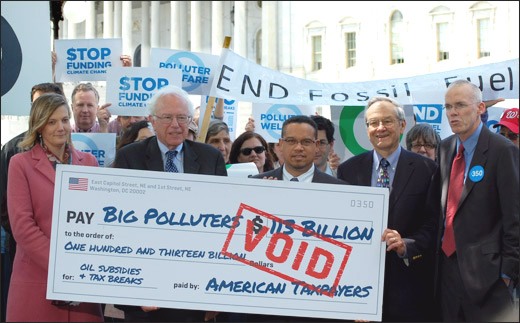There was very promising motion on subsidy reform contained in this March 2011 letter to Congress signed by a large number of conservative organizations (as well as others). Since structural reform of subsidies will require a broad political coalition, the variety of groups signing on to this letter is a positive step. Elements of their letter that I found particularly important are:
1) Use of an appropriately broad definition of subsidies
"From direct payments and loan guarantees to mandates neither the environment nor the American economy can afford to be hampered by these anti-growth, anti-competitive policies." The inclusion of this mix of instruments is quite important, as it illustrates their understanding that subsidies go well beyond cash transfers, and that no matter the exact form, all can affect market positioning and competitiveness of beneficiary industries.
Contrast this statement with the position taken by the Nuclear Energy Institute's Marvin Fertel in a recent presentation to Wall Street (page 13). Fertel stated that "nuclear loan guarantees are actually a revenue generator for the government," knowingly glossing over two important facts. First, revenues and long-term credit performance are quite distinct issues. After all, mortgage closing fees made lots of money for loan originators until that little problem with borrowers not paying back their loans began to crop up. Second, even without a default, the politically-selected access to Uncle Sam's line of credit greatly reduces borrowing costs for a lucky few, undermining the market position of competitors (see item 2, below). The signatories to this letter have steered clear of these types of evasive definitions.
2) Recognition that political selection of winners via subsidies favors established industries
Such policies provide unfair advantages for some producers, typically the more politically astute, while creating competitive disadvantages to other, often more promising and more nascent technologies. Centrally controlled energy policy has not worked, Washington does not know best, and the law of unintended consequences cannot be vitiated.
3) Phased approach to level the energy playing field
The Coalition proposes four stages to their reform effort. They begin with a cessation both of new subsidy creation and of the expansion of existing subsidies (in terms of scope or time frame). They propose instead that any fiscal savings from eliminating subsidies be redeployed to the general economy through broad-based reductions in the tax rate. Given that tax expenditures overall are in excess of $1 trillion per year, broad-based reform of tax expenditures alone could provide material reductions in general tax burdens. The final stage of their plan is to dismantle the existing system of subsidies.
Additional work needed
There are some important limitations to this proposal that need to be addressed to make subsidy reform equitable and effective. For example, most subsidies to renewable energy include sunset provisions already. In contrast, many of the core subsidies to conventional fossil fuels are much older, and do not automatically expire. Thus, unless dismantling of existing subsidies comes very close in time to allowing existing ones to expire, the proposed action plan will generate its own distortions. A related issue involves externalities such as pollution. To the extent fiscal subsidies are addressed, but emissions from coal or oil remain unchecked, the playing field will remain skewed. Finally, the Coalition cites Pew's numbers for the scale of energy subsidies. This is a good starting point, but even Pew does not believe they have systematically characterized the problem. The subsidy reform "net" will need to grow wider over time if the the problem is to be fully solved.





 The NAS has engaged a highly skilled
The NAS has engaged a highly skilled